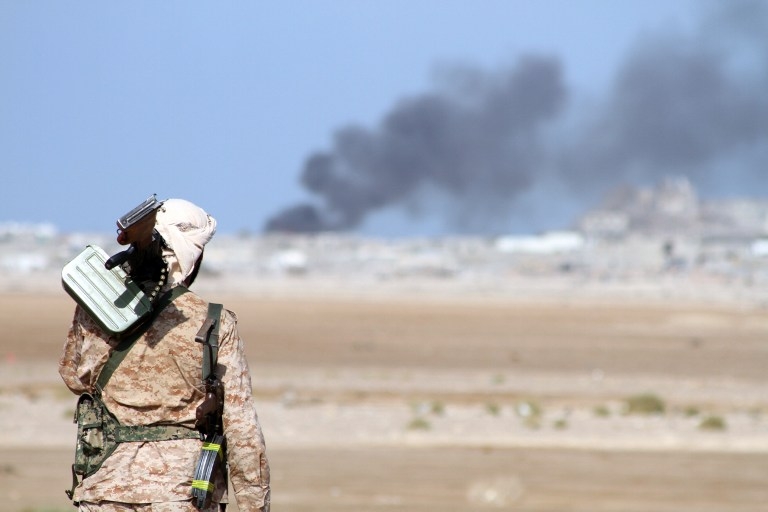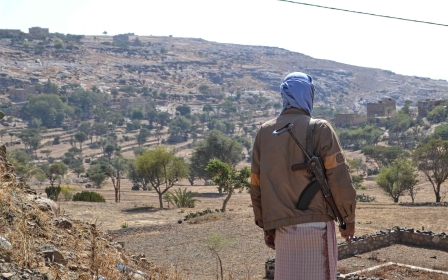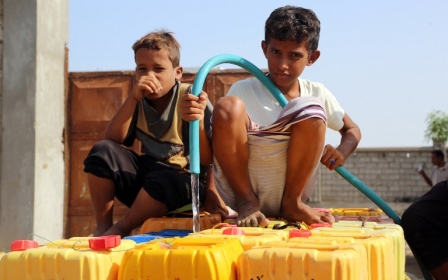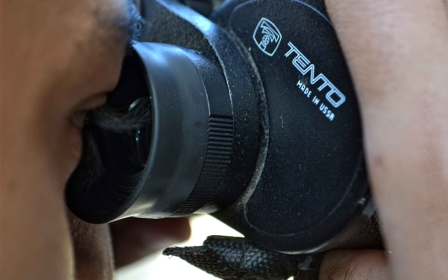Tens of al-Qaeda militants, 16 civilians dead in 'US raid' in Yemen

The death toll from a US raid on al-Qaeda in Yemen on Sunday has risen to 57 people, including 41 suspected militants and 16 civilians, a provincial official said.
Eight women and eight children were among those killed in the raid in the southern province of Bayda, the official said.
It would be Washington's first strike on militants in Yemen since President Donald Trump took office on 20 January.
Sources in the region said the raid targeted the houses of three tribal chiefs linked to al-Qaeda and that an unspecified number of civilians were also killed.
But the provincial official said Apache helicopters also struck a school, mosque and a medical facility used by al-Qaeda members.
Other sources spoke of US commandos taking part in the operation, but this has not been confirmed by credible sources.
The three prominent tribal figures killed in the attack were identified as brothers Abdulraouf and Sultan al-Dhahab and Saif Alawai al-Jawfi, the official and other sources said.
They were known for their strong links to al-Qaeda, the sources said.
The Dhahab (also referred to as al-Zahab) brothers had two other al-Qaeda brothers who were also killed in the past by drone strikes.
An al-Qaeda chief in the region, who was identified as foreigner Abu Barazan, was also killed in the attack, the official said.
The military operation is the first to be attributed to the United States against militants in Yemen since Trump took office on 20 January.
Under Trump's predecessor, Barack Obama, the United States stepped up its use of drone strikes against suspected militants in Yemen, as well as other countries including Afghanistan.
The US considers the extremist group's Yemen-based franchise, al-Qaeda in the Arabian Peninsula, to be its most dangerous.
But although the US only sporadically reports on a long-running bombing campaign against AQAP, it is the only force known to be operating drones over Yemen.
On 14 January, the Pentagon announced the killing of a senior al-Qaeda operative in Baida the week before in an air strike.
Al-Qaeda and the Islamic State group have exploited a power vacuum created by the two-year-old conflict in Yemen between the government and Shia Houthi rebels, especially in the country's south and southeast.
Baida province is mostly controlled by the Houthis, but Yakla is ruled by tribes and has at least two training bases for al-Qaeda, local sources said.
Forces loyal to President Abd Rabbuh Mansour Hadi have mounted offensives against militants in the south, but the militants remain active in several areas.
The conflict in Yemen has killed more than 7,400 people since a Saudi-led Arab coalition intervened to support Hadi in March 2015, according to the World Health Organisation.
But UN humanitarian coordinator Jamie McGoldrick said last week that as many as 10,000 civilians may have died.
At least 100 die in clashes
Meanwhile, fierce battles between Yemeni government forces and Shia rebels on the country's west coast have killed more than 100 fighters in the past 24 hours, officials said on Sunday.
The bodies of at least 90 Houthi rebels were taken to a hospital in the Red Sea city of Hudaida, which is controlled by the rebels, while 19 dead soldiers were taken to the southern port city of Aden, the medical and military sources said.
Deadly clashes have shaken the area around the key Red Sea town of Mokha since the start of the year when loyalist fighters launched an offensive to oust the Iran-backed Houthis and their allies.
Loyalists backed by the firepower of a Saudi-led Arab coalition advanced Saturday into the town after having captured its port on Monday, despite strong rebel resistance.
Clashes raged in the town on Sunday, a military official said.
Air strikes by coalition warplanes hit rebel supplies along the route between Mokha and Hudaida, the official said.
Houthi forces had controlled Mokha since they overran the capital Sanaa in September 2014 and advanced on other regions aided by troops loyal to former president Ali Abdullah Saleh.
Forces supporting President Abd Rabbuh Mansour Hadi, backed by the coalition, launched a vast offensive on 7 January to retake the coastline overlooking the strategic Bab al-Mandab Strait.
Mokha was Yemen's main port serving as its export hub for coffee until it was overtaken by Aden and Hudaida in the 19th century.
Nearly 370 combatants have been killed since government forces launched their drive up the Red Sea coastline.
New MEE newsletter: Jerusalem Dispatch
Sign up to get the latest insights and analysis on Israel-Palestine, alongside Turkey Unpacked and other MEE newsletters
Middle East Eye delivers independent and unrivalled coverage and analysis of the Middle East, North Africa and beyond. To learn more about republishing this content and the associated fees, please fill out this form. More about MEE can be found here.




